Hugo Taheny’s sporting triumphs as an elite athlete living with Down syndrome

Hugo Taheny, an elite athlete living with Down syndrome, is proof that with the right support, focus and determination, anything is possible both on and off the sports field.
Photographs Ben Kelly
From a distance, the small shed on John and Louise Taheny’s sprawling Yorke Peninsula farm looks unremarkable, with its galvanised iron exterior and rickety screen door. But behind that screen door is a treasure trove of achievements in the inspiring life of Hugo Taheny, John and Louise’s youngest child.
Hugo is an elite athlete living with Down syndrome and this “shed” is his special place, an airconditioned, timber-lined shrine to all that this remarkable South Australian has achieved as a sporting champion and health advocate.
Heavy gold, silver and bronze medals hang bunched together in the corner, too many to count at a glance, while above them is a shelf packed with shining trophies.
The shed walls are lined with framed certificates of Hugo’s record-breaking sporting achievements and photographs of this 22-year-old athlete with some of his heroes, including Power player Ollie Wines.
This shed is a calm and considered space, where light floods in through the huge window, providing spectacular views across paddocks and down to the pristine cove of Point Turton.
This shed also serves as a gym for Hugo, who is ranked number one in the world for shot-put and discus among those living with a disability.
Yet, from his muscly frame to his mental focus and steely ambition, disability is not a word that comes to mind for this young athlete, who has achieved so much.
And Hugo’s achievements are truly remarkable considering the health challenges he lives with every day. As well as Down syndrome, Hugo is legally blind, has a hearing impairment, suffers heart issues and has epilepsy.
But he is fiercely independent, getting about the family farm on his own Gator mobile, complete with “Rock Star” number plate, and always with his Jack Russell, Missy, by his side.

“Rock Star” is a name Hugo coined for himself a few years back and one which the local community has embraced in support of its homegrown hero.
A huge poster on the wall in the shed reads “Welcome home Hugo Rockstar World Champ… We are so proud of you mate”.
Last year, the community raised more than $8500 enabling Hugo and Louise to travel to France where Hugo competed at the Virtus Global Games, the world’s largest elite sporting event for athletes with intellectual disabilities.
Hugo scored gold in both the shot-put and discus, despite collapsing with heat stroke in between his events. He broke his own world record in the shot-put, throwing 11.98 metres, and the discus, throwing 32.95 metres, five metres beyond the second placegetter.
“I am really professional and I want to be the best person I can be, and to help children with a disability to have a better life,” says Hugo, who is proudly wearing his green and gold Australian T-shirt when SALIFE comes to visit.
The Global Games are the highest level at which Hugo is able to compete on the world stage, as people with Down syndrome are not eligible to take part in the Paralympics. Yet, like many of the barriers he’s experienced in life, this is something Hugo simply doesn’t accept or understand.
“I want to go to the actual Olympics, I just want to go to the one where my friend Matt goes,” says Hugo, referring to his close friend, Commonwealth Games medallist and Olympic discus thrower Matt Denny, who has become a friend and mentor.
You might like
“That is something I want to change. I told Mum and Dad I want to go to the Olympics because I feel all the hard work my parents put in for me, my father trained me so well, he’s an amazing father, and my mother helps me do all these things, she’s my sponsor, my organiser and personal assistant.
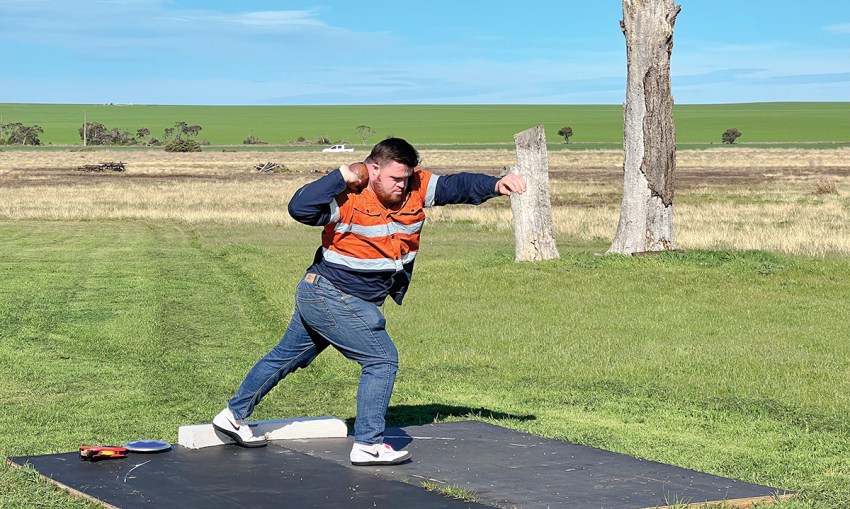
“My parents put all this effort in for me, so I would love to go to the Olympics because people would love me to go there and I’m going to show that people with a disability can do it if you give us a chance.”
Louise and John are equally as passionate about breaking down the barriers around Olympics eligibility for people living with Down syndrome.
“The Global Games is the absolute echelon that Hugo can compete at, he’s won that and broken world records, but because he’s an athlete living with Down syndrome, he’s not eligible to go any further,” she says. “We don’t think that’s fair.”
A challenge for John and Louise, despite all Hugo’s success, is that he is not a “pathway athlete”, meaning he gets no government funding. So, the couple must cover all the costs of their son’s sporting career including training, competing and travel. This prompted them to write a letter to the South Australian Minister for Sport, Recreation and Racing, Katrine Hildyard and the Federal Minister for Social Services Amanda Rishworth to raise this issue on the political agenda.
“This is a big bone of contention because Hugo is not able to be included in the South Australian Sports Institute training program, so everything he’s done is totally self-funded,” Louise says. “This is a critical issue nationally and globally. We are all about breaking down barriers because Hugo has been winning awards that in the past only Paralympic athletes have won.
“We would really just hope to see greater equality for all athletes, starting with our state and federal governments providing the same opportunities for all elite athletes with regard to funding but also with training, athlete wellbeing and nutritional support and competition opportunities.”
John adds: “As a really little kid Hugo would say, ‘I want to represent Australia’, and we kind of said, ‘oh yeah’, and you go along for the ride wondering how that’s ever going to happen. He often says things that he’d love to do and you know what? He usually does. Now, he’s competing for Australia.
“We want him to do that at a level that reflects his full potential and with the same supports as other athletes.”
Hugo’s sporting success includes competing at the Australian National Track and Field Championships in 2023 where he won the highly acclaimed title of Open Men’s Para Discus for the third year in a row, and the shot-put title for the second year in a row, competing against many highly ranked Paralympians.
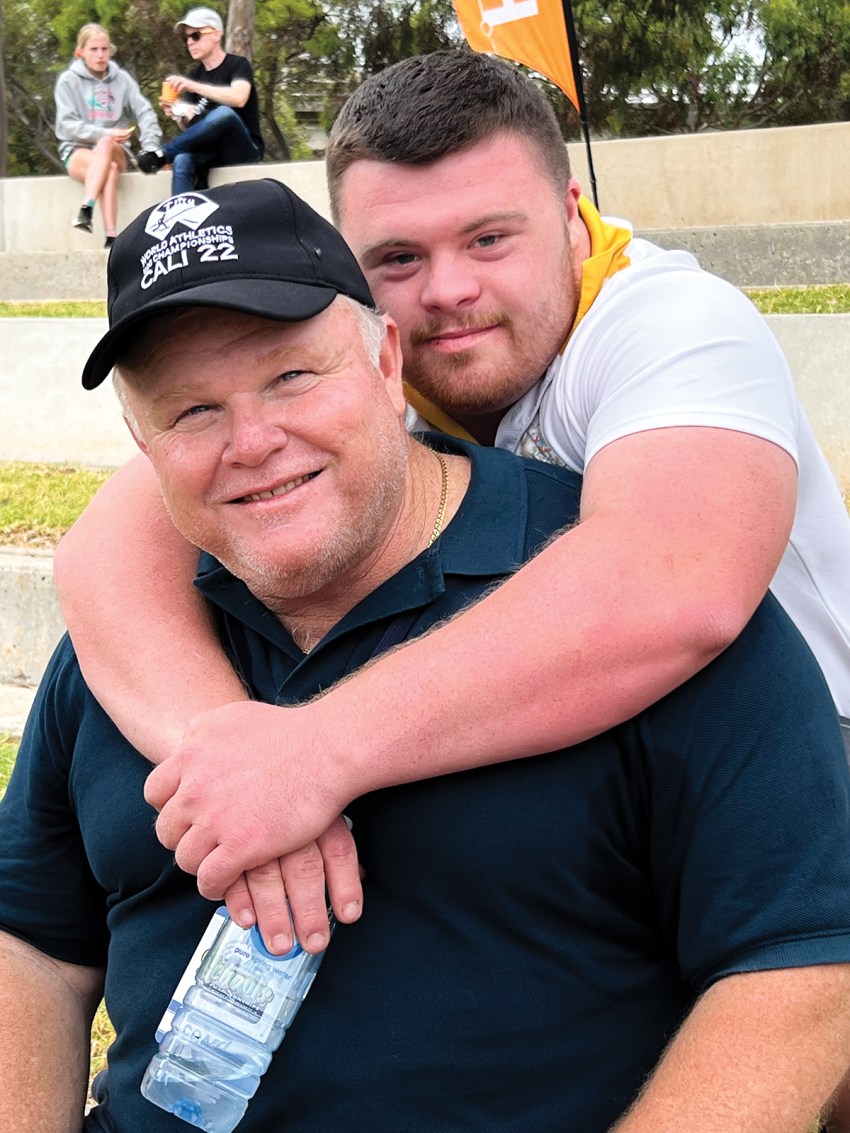
Hugo is also the current world-record holder in the 4x100m relay in the Virtus Global Games and at the International Athletics Association for Persons with Down Syndrome.
“There are no other athletes living with Down syndrome competing for South Australia at the moment,” Louise says. “That’s what we’d like to change and Hugo wants to change.” Not far from their farm house, Louise and John have set up an outdoor training area for Hugo, including a toe board, where he practices throwing his shot-put and discus into the vast paddock ahead.
Creating opportunities for their son in the able-bodied world is something this farming couple has dedicated themselves to since Hugo was born in 2001.
At the time, Louise and John had four children Edwina, then six, Tom, five, Lucy, three and Will, two. They were unaware there was anything out of the ordinary with Hugo until he was three days old and they were told he had Down syndrome.
“He was born in the Yorketown Hospital and then we had to take him to the Women’s and Children’s where they discovered the top half of his heart hadn’t formed properly and they told us to take him home and love him up because they weren’t sure how long we’d have him,” Louise says. “I remember our GP said that 20 years ago these kids would have been put in cupboards, locked away. Hugo was about a week old and right then and there we made the decision to give him every opportunity that we would give our other children.”
It was a tough start to life, though; Hugo didn’t eat solids until he was four years old and was fed through a nasogastric tube. The family kept suitcases packed and lined up in the hallway in case they needed an emergency dash to the Women’s and Children’s Hospital if Hugo’s heart failed. It did when he was two years old, necessitating open-heart surgery. “He still has a leaky heart valve, but we just monitor that,” John says.
Yet, despite all his health challenges, Hugo has never expected special treatment. Like his siblings, he attended Yorketown Area School and immersed himself in country sport including football, basketball and athletics, earning a reputation as a gutsy and competitive participant.
“Everything he did was mainstream, there’s no other choice living in the country, so he’s just grown up competing against able-bodied people in everything,” John says. “But that also means for years he didn’t win a thing, yet he had to be so resilient just fronting up and competing.

“That went well until he was about 14 and he couldn’t see the ball anymore and he couldn’t run with his heart condition. It just became really difficult.”
Hugo eventually gave up team sports and concentrated on athletics, gravitating towards shot-put and discus where his body shape and natural talent came into play. He competed against able-bodied athletes at the South Australian Public Schools Amateur Sports Association events and, while he didn’t always win, Hugo did well and occasionally won a medal. But a pivotal moment occurred in 2018 when John and Louise were contacted by Michael Thompson from an organisation called Sports Inclusion Australia which advocates for athletes with intellectual impairments. Up until then, John and Louise had no idea such an organisation existed.
“Michael had heard about Hugo, this boy living with Down syndrome competing against able-body athletes, and he tracked us down,” John says.
“And from there, Hugo’s athletic career and confidence has just gone berserk. We had no idea sports inclusion was even a thing.”
The family now travels 1000 kilometres a week to and from the SA Athletics Stadium at Mile End so Hugo can compete on Saturdays with the Western Athletics Club, and train with them every Thursday and Sunday with a group called the “bomb squad”, coached by Steve Larsson from Athletics South Australia.
“We’re called the ‘bomb squad’ because we throw it very hard,” Hugo says. “Steve teaches me technique and he listens to me and I listen to him and to Dad when they are coaching me.
“I focus and I think about what my parents have said and the advice from my team and my coach and I’m also thinking about my fingers, what I’m doing, about my technique.”
Subscribe for updates
The “bomb squad” is comprised of both able-bodied athletes and those living with a disability. It is an incredibly elite group, with members competing at the state, national and international level and Hugo was invited to join the group in 2020.
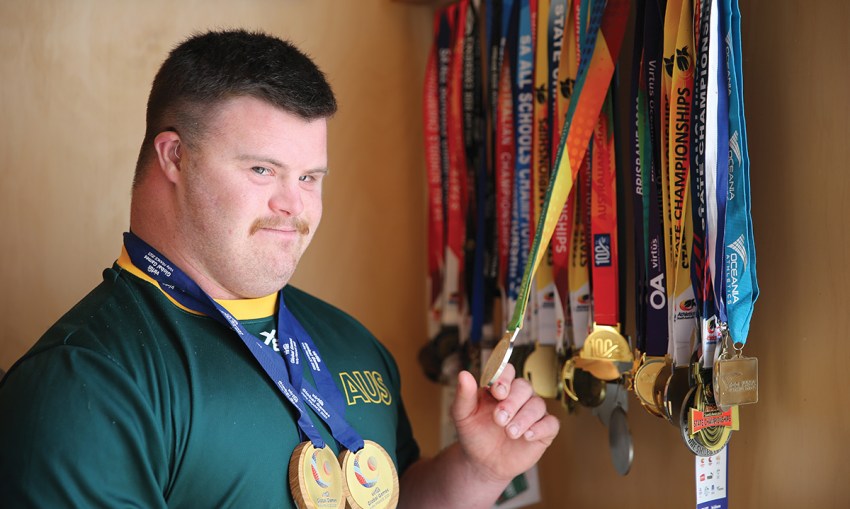
John adds: “Steve Larsson was asked once, ‘how do you get the best out of Hugo?’, and he said, ‘I treat him the same as I treat every other athlete’ and that is a common thread.” Hugo has become great mates with able-bodied elite athletes Will Evans and Darcy Miller whom he met through Western Athletics.
“Those guys celebrate my wins with me and are also so happy about it and they tell Mum, Dad and my coach about it,” says Hugo. “When they first introduced themselves to me, I said, ‘hi, my name is Hugo Taheny or you can call me Rock Star’, and they just erupted.
“We have become good friends now and we go to the movies and sometimes to the gym together.”
Louise continues: “They are your good mates who love your sense of humour. They have an absolutely beautiful relationship; they are just the best of mates and there’s a massive amount of respect that goes each way.”
Hugo is also very close with his four siblings and was recently best man at his brother Tom’s wedding. Tom married Charlee Hodges, an elite netballer and daughter of Port Adelaide great Scott Hodges, and granddaughter of Magpies icon John Cahill.
“Ryan Burton (AFL player) was at the wedding and he called Ollie Wines who sent Hugo a message of good luck on the day,” Louise says.
“We are lucky that Hugo has had lots of opportunities and we’re incredibly proud of him. All of our other children say, ‘we’re so much better people having Hugo in our lives’. Tom said to me once, ‘when I’m having a bad day, I think of Hugo and what he faces and conquers every day’.
“They don’t treat him any differently, they don’t cut him much slack, and they have a fabulous relationship.”
Hugo is particularly close to his brother Will, 24, who tragically last year was involved in a car accident that has left him a quadriplegic. Will spent eight months in a spinal unit at the Daw Park Spinal Rehabilitation Unit and now lives in independent accommodation in Adelaide as a transition to coming home to the farm. Louise, who was working as an early childhood consultant with the Education Department when the accident occurred, took leave to be by Will’s side for most of 2023.
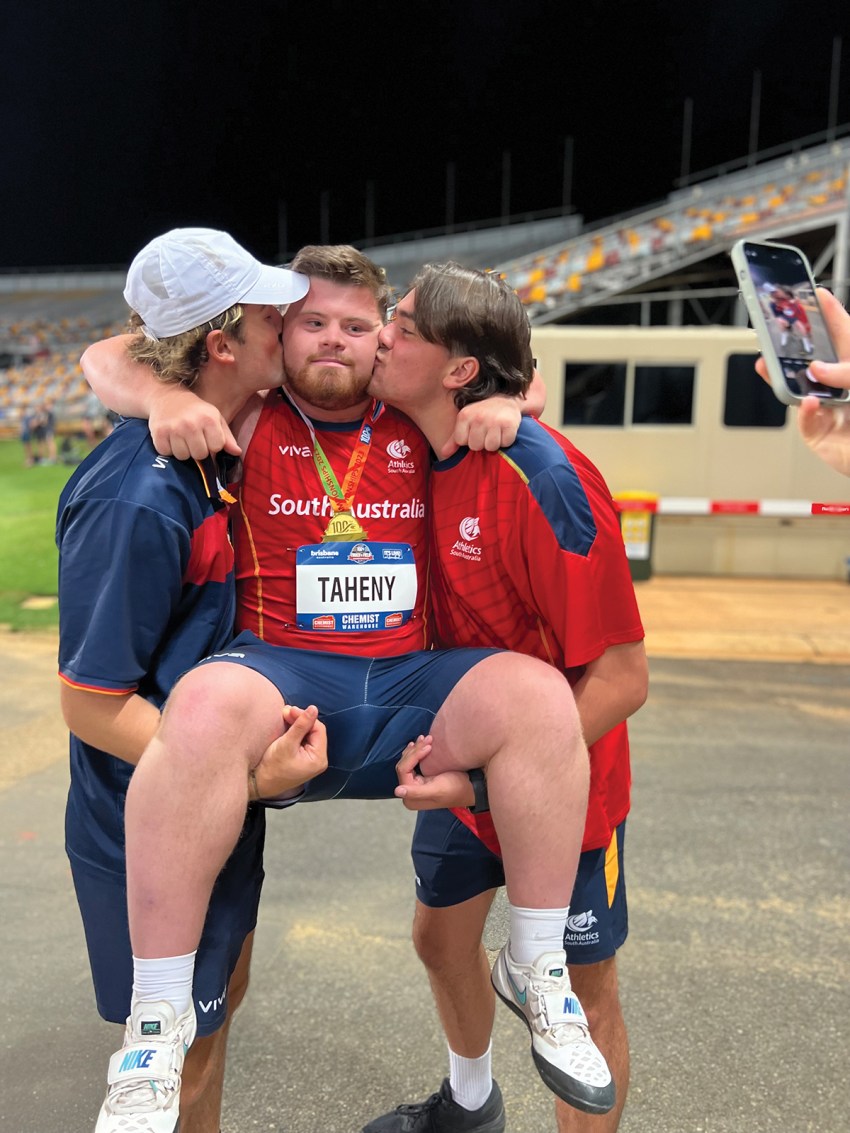
Hugo, too, was with Will through much of his rehabilitation, sharing an empathy and understanding only known by someone who has navigated disability every day of his life.
“Will can move in a wheelchair, but I help him,” says Hugo, “We need to find a cure so my brother can walk again.
“In my heart I like to help people have a better life and now I’m doing that for Will. Life is not about the future or money, it’s about the people you love and the people you choose to have in your life.
“I don’t say it’s a sacrifice, I just say, ‘How can I help and be kind?’. That’s it.”
Hugo’s warm personality, humour and talent have earnt him near-celebrity status at the Western Athletics Club, where he has a league of young fans. He also coaches young athletes on Yorke Peninsula, and regularly talks at local schools to inspire the next generations of country kids to follow their dreams.
One local student Oscar McNeair, 14, showed interest and potential in shot-put and discus, so Hugo invited him out to the paddock and gave him some tips. Oscar went on to compete in the State Championships and broke discus records.
“He got me a shirt with ‘coach’ written on the back,” Hugo adds proudly.
Hugo is also a health ambassador for Down syndrome Australia and was recently asked to talk to 200 nursing students at Flinders University around issues of inclusion and adopting better communication and health outcomes for people with Down syndrome.
“Hugo can’t read or write, but he did a PowerPoint presentation and was prompted by the pictures and he just walked around the room with a microphone talking to these nursing students. He was amazing,” John says.
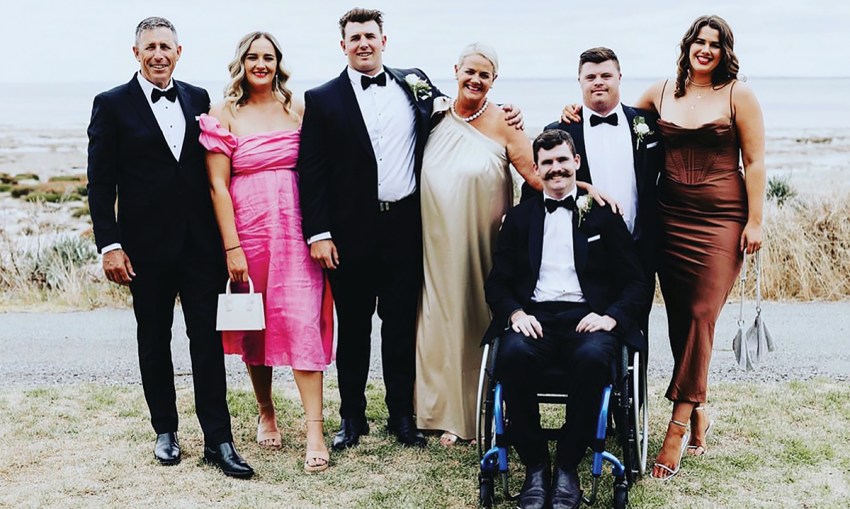
It is little wonder this inspiring South Australian has won numerous sporting and civic awards including the Australian Sports Medal for representing Australia at the Virtus Global Games in 2019, the 2020 Yorke Peninsula Council Young Citizen of the Year, and was named as one of 11 ambassadors for 2023’s International Day of People with Disability.
Last year, all of Hugo’s achievements culminated in his nomination as a finalist for Young South Australian of the Year.
“Athletics has given Hugo a purpose and a sense of belonging,” Louise says. “When he walks into Stadium SA every Saturday, you hear ‘’g’day rock star’, ‘g’day rock star’. It’s the same in our community. He feels good and he’s absolutely flourished, particularly in his ‘bomb squad’ group where he’s just another thrower.”
Louise and John’s dedication to support Hugo in both his sporting and advocacy work is as awe-inspiring as their son’s determination and achievements. But it’s clear this couple’s vision is not just about helping their son – it’s about opening up pathways for all South Australians living with a disability.
“We’ve always advocated a ‘person first’ approach,” Louise says. “We support Hugo to make a difference in the world of athletics and beyond, and because he’s been so successful, it’s great that we can leverage that.
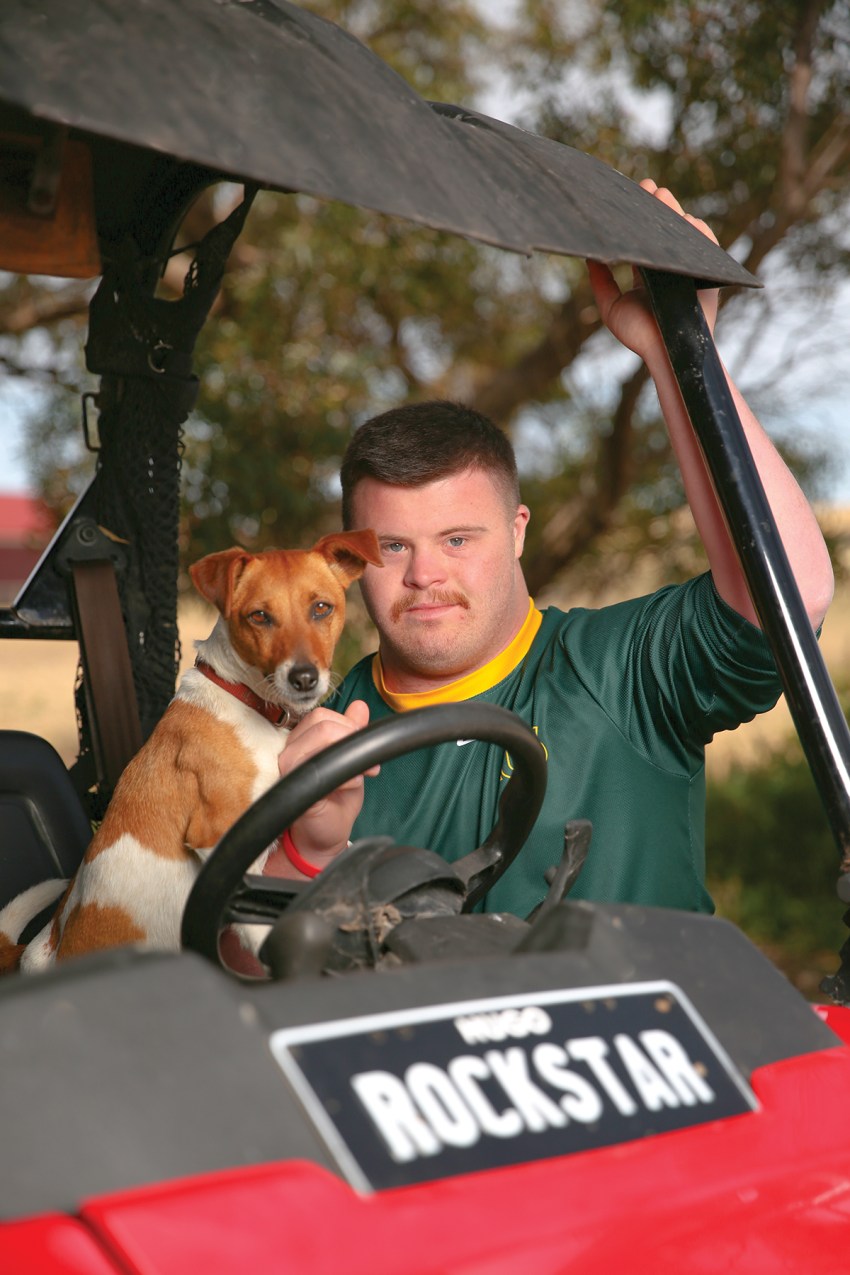
“To start with it was all about helping Hugo, but now it is all about helping others get acceptance and form friendships.
“Hugo said to us recently that he loves his family because we have given him choices. That’s really what it’s all about.”
In the future, Hugo dreams of owning his own business, living in the Adelaide Hills and continuing to help anyone who is struggling with their physical or mental health.
“I want to make people happy,” he says. “And I’d also like to light the cauldron at the Brisbane Olympics in 2032.”
With Hugo Taheny, you get the feeling that is a distinct possibility.
This article first appeared in the February 2024 issue of SALIFE magazine.





